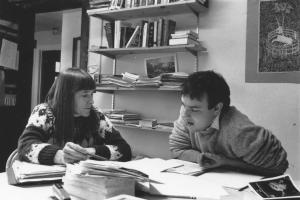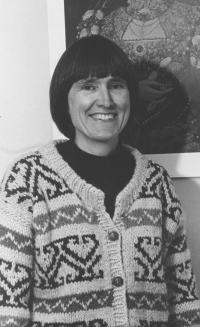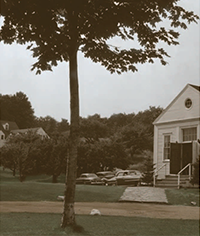“The first winter I was here we got a big snowstorm, and when I finally got to campus with my snowshoes and shovel, there were the president and the dean shoveling the walks around Mather,” said Laura Stevenson. “I pitched in, thinking, ‘I love this place.’” The staff has grown considerably since 1986, when Laura began teaching writing and literature at Marlboro, but her steadfast support for excellent writing at Marlboro has remained the same. This year we bid farewell to Laura, as she retires to the idyllic life of reading, writing and gardening at her Wilmington farm.
“Laura has been the best kind of colleague anybody could wish for,” said writing professor John Sheehy, who has worked alongside her since 1998. “She treated me, as a fellow teacher and scholar, the way she treated students: she wanted, always, to see our best. It is that quality in her—high expectations, combined with an unflagging confidence that we would meet them—that make her such a valuable ally for a writer, or for a teacher.”
Laura’s students over the years had the same assessment. “My favorite thing about having her as a professor was that she didn’t treat me as if she were a professor and I a student,” said Emily Field ’11. “She treated me as a peer and an equal, a respected fellow writer who could be negotiated with instead of a student who had to be dictated to. That kind of display of confidence does wonders for a writing student.”
 Mark Roessler ’90 said, “I had an epic, young adult fantasy novel I’d been pecking away at through high school, and I was looking for guidance. Little did I know, Laura had been working on a young adult fantasy novel of her own. Over a weekend, she read my book. She told me she thought she could help me, and for the first time in my life, I felt that I was being taken seriously as a writer. Right off the bat, she began to prescribe remedies that have had a positive, lifelong effect.” Mark is now managing editor of the Valley Advocate.
Mark Roessler ’90 said, “I had an epic, young adult fantasy novel I’d been pecking away at through high school, and I was looking for guidance. Little did I know, Laura had been working on a young adult fantasy novel of her own. Over a weekend, she read my book. She told me she thought she could help me, and for the first time in my life, I felt that I was being taken seriously as a writer. Right off the bat, she began to prescribe remedies that have had a positive, lifelong effect.” Mark is now managing editor of the Valley Advocate.
“Laura does not condescend,” said Becca Mallary ’11, who found in her a perfect mentor for her Plan work in young adult fiction and feminism. “Her willingness to treat everyone as her equal is also what makes her such a masterful storyteller, and she taught me that talking down to your reader gets you nowhere. You must trust them if they’re going to trust you. The same can be said for the relationship between Plan sponsor and student, and it was such a joy to build a relationship based on trust, respect and mutual interests with her.”
“The most gratifying thing about teaching writing is watching the students get better,” said Laura. “They find they can do it, and then they just take off.”
Laura’s own writing took off as well, after she started teaching at Marlboro. A Yale-trained historian and author of Praise and Paradox: Merchants and Craftsmen in Elizabethan Popular Literature (1984), she has published four children’s novels since 1990 (Happily After All, The Island and the Ring, All the King’s Horses and A Castle in the Window) and in 2010 a novel for adults (Return in Kind) . A National Endowment for the Humanities research fellowship in 1996–97 resulted in several critical studies of late 19th-century children’s literature. But some of her greatest joys were found collaborating on short works of children’s fiction with Marlboro student illustrators.
“Through working with Laura I definitely became a better translator of thoughts into doodles— a crucial skill when illustrating,” said Ulla Valk ’03, who as a junior illustrated Laura’s “The Knight of the Side-Hill Wumpus” (Potash Hill , Summer-Fall 2002). “It was the first time I had to come up with characters and surroundings that actually corresponded with those in another person’s head. The particularly cool thing about doing that with Laura was that she has an awesomely rich imagination and this incredible ability to very elaborately describe what she envisions.”
 Besides helping many individual student writers along, Laura’s lasting legacy at Marlboro has been her role in building a solid writing program. She said, “The writing requirement was in place when I came, but nobody quite knew how it worked or how long students got to pass it, and the whole thing was without direction. In the early 1990s the present setup of nonrequired, interdisciplinary writing seminars was created by the English Committee, under my direction, and that has stayed in place ever since. Writing isn’t taken for granted at Marlboro; it gets a lot of attention. That’s a real achievement—and certainly not just my achievement.”
Besides helping many individual student writers along, Laura’s lasting legacy at Marlboro has been her role in building a solid writing program. She said, “The writing requirement was in place when I came, but nobody quite knew how it worked or how long students got to pass it, and the whole thing was without direction. In the early 1990s the present setup of nonrequired, interdisciplinary writing seminars was created by the English Committee, under my direction, and that has stayed in place ever since. Writing isn’t taken for granted at Marlboro; it gets a lot of attention. That’s a real achievement—and certainly not just my achievement.”
Laura’s quiet confidence and patient persistence were an inspiration to many, made even more inspiring because she taught with what, for most teachers, would be a profound disability. She began losing her hearing before she came to Marlboro and taught for many years unable to hear at all before she had a cochlear implant.
“She soldiered on, always,” said John. “She figured out ways to teach when she couldn’t hear—to lead discussions, to confer privately with students, to guide students in their thinking and their writing. I think it is a testament to just what kind of teacher she is, what kind of person she is, that if you asked just about any of the students who loved her over the years to tell you about Laura, probably none of them would even mention that she is deaf. She made managing her deafness look easy.”
“Laura believes that everyone, everyone , has the ability to write well, and of course she is right,” said Emily. “I don’t know where she gets the compassion and the patience—or the wisdom. She doesn’t even make a big deal out of it, like she’s ‘rescuing’ a student. It’s just everyday business for her, getting good work out of a diverse array of students. Like it’s the easiest thing in the world.”
John added, “She made most things look easy. She is one of the smartest, funniest, most thoughtful and least complacent people I know. She is the absolute original of herself.”

